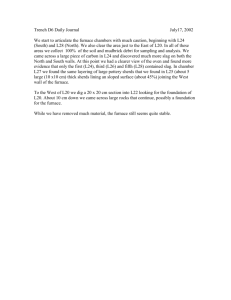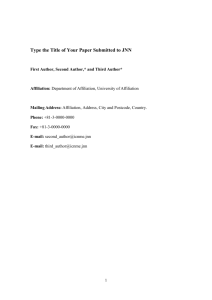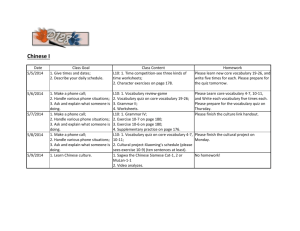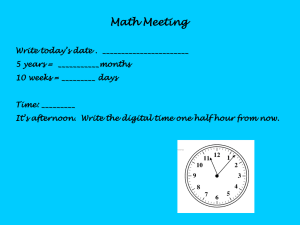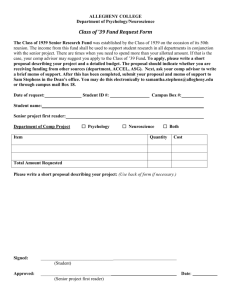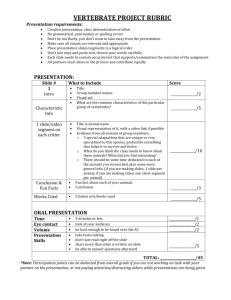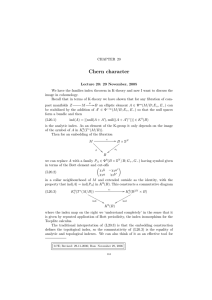Operating System and Input/Output
advertisement
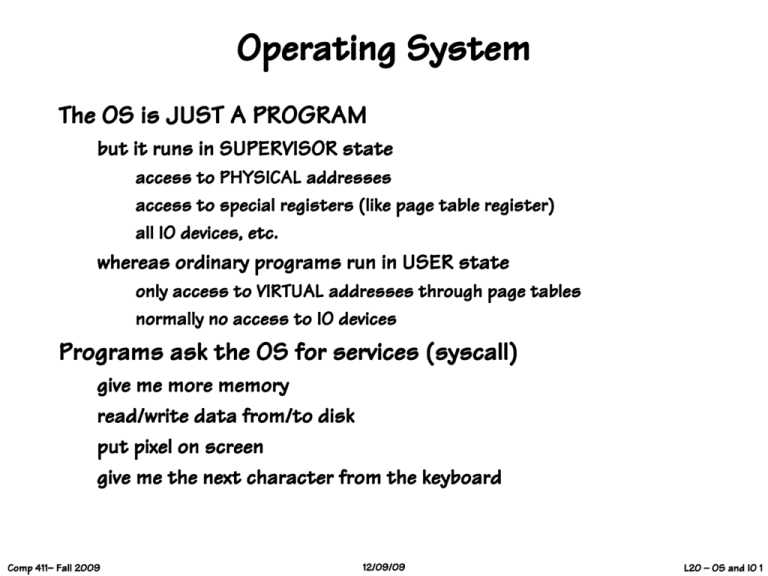
Operating System The OS is JUST A PROGRAM but it runs in SUPERVISOR state access to PHYSICAL addresses access to special registers (like page table register) all IO devices, etc. whereas ordinary programs run in USER state only access to VIRTUAL addresses through page tables normally no access to IO devices Programs ask the OS for services (syscall) give me more memory read/write data from/to disk put pixel on screen give me the next character from the keyboard Comp 411– Fall 2009 12/09/09 L20 – OS and IO 1 OS Execution The OS keeps a PROCESS TABLE of all running programs disk location of executable memory location of page tables priority current status (running, waiting ready, waiting on an event, etc.) PID (process ID) a number assigned to the process A PROCESS is an independent program running in its own memory space The OS allocates a new entry in the PROCESS TABLE And sets up the PAGE TABLE for the new process Comp 411– Fall 2009 12/09/09 L20 – OS and IO 2 Initial Page Table memory page table 0x00000000 0 text segment 0x00001000 0 text segment 0x00002000 1 data segment 0x00003000 0x00004000 0x00005000 disk 0xffffe000 0xfffff000 1 foo stack swap foo Comp 411– Fall 2009 12/09/09 L20 – OS and IO 3 Page Fault in the Text memory page table 0x00000000 1 0x00001000 0 text segment 0x00002000 1 text segment data segment 0x00003000 0x00004000 0x00005000 disk 0xffffe000 0xfffff000 1 foo stack swap foo Comp 411– Fall 2009 12/09/09 L20 – OS and IO 6 Allocate a block of memory page table 0x00000000 1 0x00001000 0 text segment 0x00002000 1 data segment 0x00003000 1 heap 0x00004000 1 heap text segment 0x00005000 disk 0xffffe000 0xfffff000 1 foo stack swap foo Comp 411– Fall 2009 12/09/09 L20 – OS and IO 8 Fault in the other page of TEXT memory page table 0x00000000 1 text segment 0x00001000 1 text segment 0x00002000 1 data segment 0x00003000 1 heap 0x00004000 1 heap 0x00005000 disk 0xffffe000 0xfffff000 1 foo stack swap foo Comp 411– Fall 2009 12/09/09 L20 – OS and IO 9 Grow the stack memory page table 0x00000000 1 text segment 0x00001000 1 text segment 0x00002000 1 data segment 0x00003000 1 heap 0x00004000 1 heap 0x00005000 ... 0xffffd000 1 0xffffe000 1 0xfffff000 1 disk foo stack swap foo Comp 411– Fall 2009 12/09/09 L20 – OS and IO 11 Partially Paged Out memory page table 0x00000000 1 text segment 0x00001000 1 text segment 0x00002000 1 data segment 0x00003000 0 heap 0x00004000 1 heap 0x00005000 ... 0xffffd000 1 0xffffe000 1 0xfffff000 1 disk foo stack swap foo Comp 411– Fall 2009 12/09/09 L20 – OS and IO 13 Later we need that page memory page table 0x00000000 1 text segment 0x00001000 1 text segment 0x00002000 1 data segment 0x00003000 1 heap 0x00004000 1 heap 0x00005000 ... 0xffffd000 1 0xffffe000 1 0xfffff000 1 disk foo stack swap foo Comp 411– Fall 2009 12/09/09 L20 – OS and IO 14 Exit Finally our program exits It calls the “exit” system call to notify the OS that it is done The OS puts the memory back on the free list Cleans up the PAGE TABLE and PROCESS TABLE And goes on about its business... Comp 411– Fall 2009 12/09/09 L20 – OS and IO 15 Interrupts How does the CPU manage SLOW I/O devices? Programmed I/O Interrupt Driven I/O Comp 411– Fall 2009 12/09/09 L20 – OS and IO 16 Polling Advantages Simple No surprises Processor in full control Disadvantages Polling can waste lots of time •IOC = i/o controller Comp 411– Fall 2009 12/09/09 L20 – OS and IO 17 Interrupt Driven I/O Advantage CPU only bothered when actually needed Disadvantage Can occur at surprising or inconvenient times Have to save and restore state Comp 411– Fall 2009 12/09/09 L20 – OS and IO 18 Quick overview of I/O devices This is the “rest” of the computer – Used to be called “peripherals” – …but that term does not do justice to them! Comp 411– Fall 2009 12/09/09 L20 – OS and IO 21 Magnetic Disks: Outside Comp 411– Fall 2009 12/09/09 L20 – OS and IO 23 Inside Comp 411– Fall 2009 12/09/09 L20 – OS and IO 24 Platters and Heads Comp 411– Fall 2009 12/09/09 L20 – OS and IO 25 Magnetic Disk Organization • Cylinder: All tracks under head with arm in a fixed position • Read/Write time has 3 components •Seek time to move the arm •Rotational latency: wait for the desired sector to come by •Transfer time: transfer bits Comp 411– Fall 2009 12/09/09 L20 – OS and IO 26 CD Comp 411– Fall 2009 12/09/09 L20 – OS and IO 27 CRT Display Comp 411– Fall 2009 12/09/09 L20 – OS and IO 28 LCD Comp 411– Fall 2009 12/09/09 L20 – OS and IO 29 Graphics Cards Comp 411– Fall 2009 12/09/09 L20 – OS and IO 30 Polygons to Surfaces • Numerical coordinates specify vertex positions in 3D • Matrix multiply transforms 3D coordinates to eye coordinates • Divide projects 3D to 2D in perspective • Pixel processors fill polygons with appropriate colors based on lighting model Comp 411– Fall 2009 12/09/09 L20 – OS and IO 31 Sound Sound is variations in air pressure A microphone converts these into an analog electrical signal An analog-to-digital converter samples this at frequent intervals The resulting numbers are stored in a file (.wav) On playback a digital-to-analog converter changes these numbers into an analog electrical signal And the moving cone of a speaker converts this into varying air pressure Comp 411– Fall 2009 12/09/09 L20 – OS and IO 32 That’s it folks! You now have a pretty good idea about: • How computers are designed and how they work – – – – – – – How data and instructions are represented How arithmetic and logic operations are performed How ALU and control circuits are implemented How registers and the memory hierarchy are implemented How performance is measured How performance is increased via pipelining (briefly) What the rest of the computer looks like (disks, sound, etc.) • Final exam on Dec 11 (see website) Comp 411– Fall 2009 12/09/09 L20 – OS and IO 33
